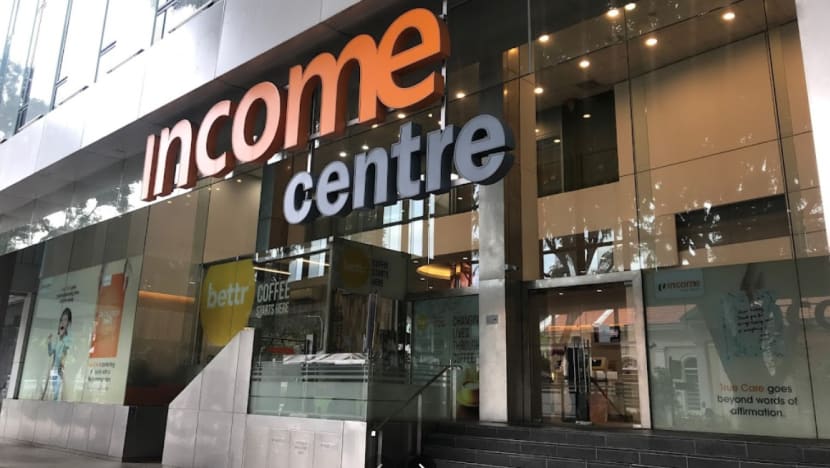Advertisement
After public outcry and a government intervention, the Allianz-Income deal is off and the local insurance company is back at square one, says NUS Business School’s Lawrence Loh.

The Income Insurance building at Bras Basah Road. (Image: Google Street View)
New: You can now listen to articles. 
This audio is generated by an AI tool.

27 Dec 2024 06:00AM
SINGAPORE: With Allianz out of the picture, Income Insurance is now back to the drawing board.
German insurance multinational Allianz withdrew its S$2.2 billion (US$1.6 billion) bid to acquire 51 per cent of Income on Dec 16, ending a five-month contentious saga that saw public backlash and the Singapore government stepping in to stop the deal.
A core consideration is the social mission of Income. Formerly a co-operative founded in 1970 under the National Trades Union Congress (NTUC) to provide essential, affordable insurance to underserved workers, it became a corporate entity in 2022 to achieve flexibility and growth options.
In blocking the acquisition, the government also revealed that there was a surplus of about S$2 billion at corporatisation that received ministerial exemption to be carried over to the new entity. The surplus would otherwise have had to be returned to the Co-operative Societies Liquidation Account to benefit the sector generally.
The last straw was Allianz’s intent to reduce Income Insurance’s share capital and return some S$1.85 billion in cash to shareholders within three years. This is tantamount to value capture of public money for private gains.
With this new information revealed – disclosed publicly in parliament in October – the capital reduction plan by Allianz completely weakened initial assurances that it would maintain Income Insurance’s social mission.
SEARCH FOR ALTERNATIVE BUYER
Where does the Allianz withdrawal leave Income Insurance? An immediate option is to look for an alternative acquirer.
Earlier arguments for the acquisition revolved around keeping it competitive. Majority stakeholder NTUC Enterprise had revealed that Income had lost on several key contracts.
In the current state, Income Insurance will need to continually attain financial resilience, especially during crises. To protect policyholders, it must be competitive and earn its return to capital. More importantly, it must meet the regulatory capital adequacy requirements.
During the COVID-19 pandemic in 2020, there were financial injections by majority stakeholder NTUC Enterprise amounting to S$100 million and another S$300 million on standby to safeguard the solvency. In addition, Income Insurance itself had to issue S$800 million in subordinated bonds.
While Income Insurance’s capital adequacy ratio is currently at a healthy level, it cannot rely always on NTUC Enterprise or the broader labour movement for support, particularly as a bailor of last resort.
A LOCAL WHITE KNIGHT?
So who may be a possible white knight in acquiring Income Insurance?
Given public sentiment arising from the Allianz episode, it is less likely that a global player will be acceptable to the stakeholders and the public, even if there are no lack of possibilities from Europe or North America or even Asian countries such as China and Japan.
How about local entities such as Temasek or DBS Bank?
As a state-owned global investment company, Temasek seems a suitable entity to own Income Insurance directly. It has a strong social mission and a portfolio of key companies across the world.
Being a non-listed entity, it is not subject to the strict mandatory compliance obligations of listed companies and could thus focus on serving workers and the lesser income groups. This would fill the gaps in the profit-driven competitive insurance space.
But should Temasek move into insurance simply to prop up any company? Will this, on the contrary, result in inefficiencies? Something will have to give and someone will have to pay the bill. Less returns for Temasek means less contribution to the national budget and some other social needs may be displaced.
DBS Bank, a global award-winning and the largest Southeast Asian bank by assets, may be poised as a possible local bank to acquire Income Insurance. It has historically owned the Insurance Corporation of Singapore which was subsequently sold in 2001.
Compared to the other two big local banks which have insurance subsidiaries – OCBC Bank has Great Eastern and UOB has United Overseas Insurance – DBS Bank may merge its existing insurance offerings with those of Income Insurance to achieve economy of scale as well as cross-product benefits with the rest of the bank.
But any move by DBS Bank must be driven by solid finance, especially now that the S$2 billion surplus is probably off-limits. The acquisition must make commercial sense even if the social mission is retained – it cannot be national service.
PURSUIT OF ORGANIC GROWTH
Another option is for Income Insurance to grow from within itself or organically. This is a most obvious and viable choice as new strategies for market and product development can be actively pursued.
New ideas and talent will be needed for organic growth. It may strengthen its distribution strategy, such as through the financial advisory channels which it is already pursuing. The key challenge may be one of contradiction: Income must go mass market yet focus on the target worker market – a dual market strategy may be considered but this is difficult to manage.
Diversification into related financial products may be considered. But this risks diluting its insurance focus and distracting management attention.
New sources of capital will have to be sought. One suggestion has been to list on the stock exchange. But this has to be weighed carefully considering the compliance requirement and the shareholder pressure for financial returns.
Income Insurance probably cannot revert to its original co-operative model. There may be merits but the key question is where future funding may come from. Should the trade unions foot the bill thus draining resources from other areas of worker welfare? Will mass market customers support its social mission and buy into products that aren’t the most competitively priced?
The choice of strategic options to get to Income Insurance 2.0 is complex. It needs to retain its social character but must also be able to withstand the global market test.
This is a tall order. And if it fails, the broader question will be: What would Singapore lose in the insurance space especially on the social front and should public funds be allocated accordingly?
Lawrence Loh is Director, Centre for Governance and Sustainability of NUS Business School at the National University of Singapore, where he is also Professor in Practice of Strategy and Policy.
